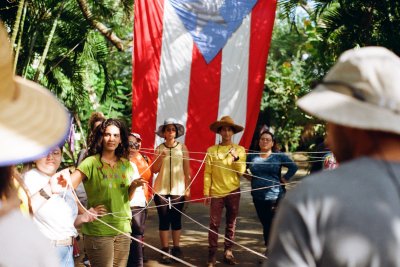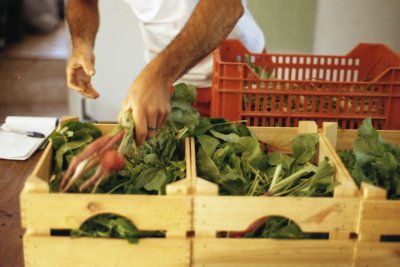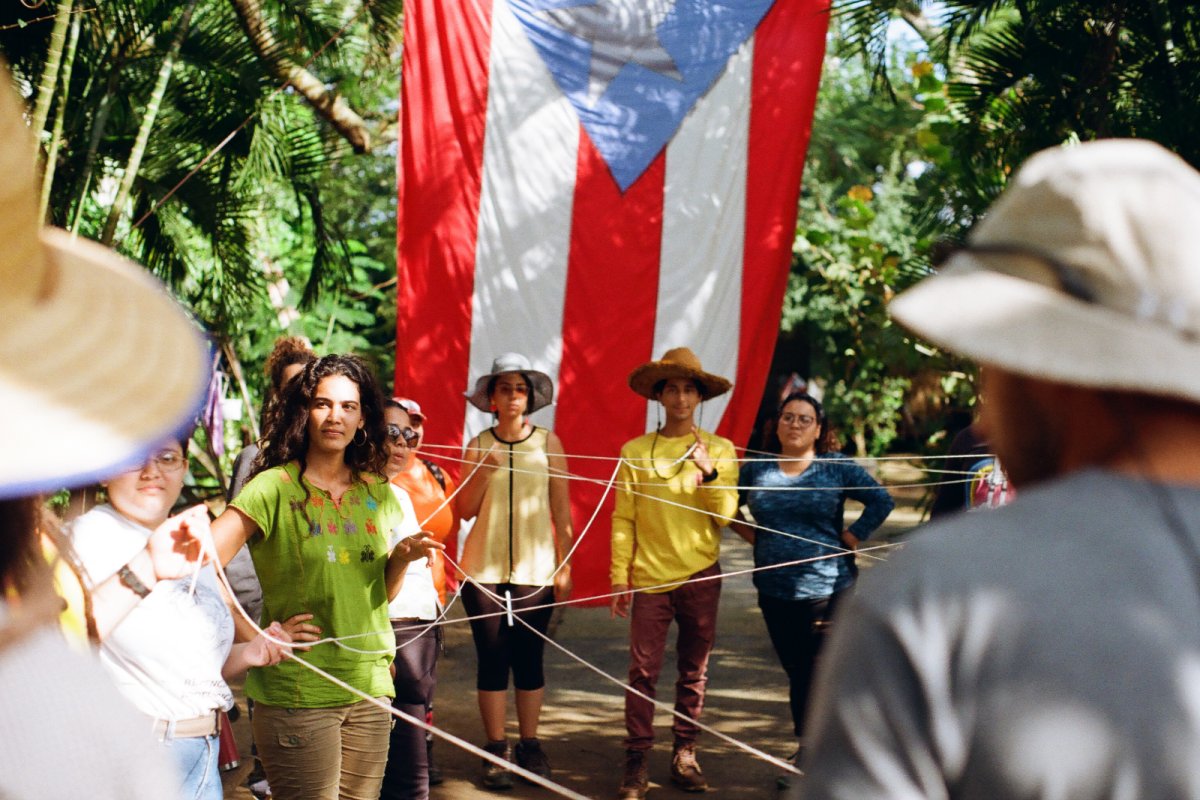 University of Puerto Rico - Utuado students take part in an exercise to demonstrate resilience in an agroecosystem. Credit: Lucas Worsdell | Raíces de Soberanía
University of Puerto Rico - Utuado students take part in an exercise to demonstrate resilience in an agroecosystem. Credit: Lucas Worsdell | Raíces de Soberanía
Why agroecology isn’t simply ecological agriculture
Agroecology doesn't merely = Agriculture + ecology. Thinking this overlooks the myriad of benefits that this holistic way of farming can deliver to individuals, communities and society. At a food systems level, agroecology has the potential to support justice and equity for both people and the planet.
It is natural, given its name, to think of agroecology as a more ecological way of food growing. There is also a tendency in Europe, and particularly in the UK, to equate the two.
I have noticed this in academic circles, from which the science of agroecology was mostly about using an ecological framework (i.e. studying the relationships between organisms) to analyse and improve agricultural systems (though there are more holistic agroecological departments that have established themselves more recently, such as the Centre for Agroecology, Water and Resilience at Coventry University). Indeed, there are noteworthy benefits to the environment as a result of farming more agroecologically, such as building up soil health, encouraging biodiversity and reducing farm emissions.
However, the risk of over-emphasising the ‘ecology’ in ‘agroecology’ is that we lose touch with firstly, the (Latin American) roots of agroecology as a way to document and champion indigenous and local knowledge, and as a peasant movement to recognise the rights of farmers and rural communities for self-determination and autonomy.
Secondly, in overplaying the ecological benefits, we may underplay – or even lose sight of completely – the many social and human benefits and values of what agroecology stands for at its core.
From a comprehensive review by Cornell University, agroecology addresses ‘social well-being, livelihoods, meaningful work, and gender and social equity’. These are mediated by:
- “Equity and social justice in food systems
- Supporting autonomy and well-being of food producers
- Fostering meaningful, dignified forms of food systems work
- Reshaping ways of interacting with nonhuman species and ecosystem”
Human and social benefits of agroecology in the UK
There is growing interest and action for the UK agroecological movement. Members of the Sustain Alliance, like the Landworkers’ Alliance, Soil Association and Food, Farming & Countryside Commission are helping to create this groundswell. Published in April (i.e. before the National Food Strategy white paper came out), the Food Research Collaboration came out with a paper that charts the history and current status of agroecology in the UK. It urged ‘NGOs pushing for a switch to agroecology … to work together, across sectors and interests, to convince policy-makers that systemic approaches are more likely to achieve food system sustainability than fragmented ones’.
Alongside its work on farm policy that promotes agroecological systems, Sustain’s Fringe Farming project attempts to create an agroecological bridge in peri-urban areas to link typically countryside activities to city folk. A food system based on short supply chains and more visible local markets can bring producers, processors, retailers and consumers closer together. This is most starkly beneficial in terms of creating jobs and so increasing employment (particularly at a per tonne food rate), when compared to more industrialised food systems that are based on large, complex supply chains, globalised markets and supermarket dominance.
A less obvious consequence of a localised agroecological food system is that people can become more connected to their food, where it comes from and how it is produced. This can lead to healthier diets, greater respect for nature and more meaningful support for farmers.
More locally embedded markets can also improve social prosperity and community resilience. As the pandemic and the ongoing Ukraine war has shown, food access is often the first point of vulnerability for communities – particularly in, but not limited to, deprived areas – when being hit by shocks to the system. Food production that serves local areas and is underpinned by policy and shifts in public and private resources can mitigate these shocks and help build even stronger communities and networks (examples exist across the UK).
How agroecology can help the Government reach its targets
Aside from the environmental targets the UK Government has in place, such as Net Zero, and Environmental Land Management, and to deliver natural capital assets such as water retention in cities, the perhaps less obvious but nonetheless hugely important contributions agroecology can make are to Levelling Up.

As measured by an independent evaluation of Growing Communities, a Hackney-based, community-led, fresh food scheme, relying more on localised food systems can be a huge boost for local economies (and by extension, the national economy). This can pull up those areas that have historically been left behind. Furthermore, agroecology has from the outset been concerned with those that are marginalised, underrepresented and oppressed. Moving agroecological food production in or near urban centres can open up food and farming career pathways to the most diversity-dense places. This could mean seeing more black, gay and young farmers bringing you your courgettes and apples.
Having more diverse people in the food system can lead to creativity, innovation and adaptability. Not only would this entail economic growth but also carving out a system that is more just, equitable and fit for our needs.
I saw this first-hand on a Defra farm tour in Greater Manchester that was coordinated by the Kindling Trust. A network of local food actors including Kindling’s Heritage Fruit Tree Nursery, an organic peri-urban market garden – Glebelands Organic Produce - and a community-engaged grocery cooperative – Unicorn Grocery. This was underpinned by an infrastructure that encouraged inclusiveness and fairness in the food and farming sector, and reached out to members of society that more typically cannot access healthy and affordable fresh food. Woodbank Community Food Hub is a social enterprise centred on food that houses a collection of organisations, which have set up community events, a health and wellbeing programme, a community garden and local organic farm. It is also a site for weekly veg boxes that are priced according to people’s individual means and a Farmstart, which is an incubator for new entrants to farming, providing them with the requisite skills and testing ground to become a fully-fledged agroecological grower.
Discussions with Defra staff brought out how vital this local food system is for nurturing community wellbeing even during challenging times like the pandemic and skyrocketing costs of living. Joining the dots and so fostering a systems and integrative approach seemed to be the key to delivering multiple public benefits and values. Although the evidence was there at a local scale, I don’t see why this model cannot be replicated at a national level with the right kind of political and popular backing.
Food is central to all our lives, not merely out of necessity, but because it brings us together, gives us joy and communicates ancestral traditions and practices. Likewise, farming in reality isn’t just about delivering calories to our bodies, irrespective of how the industrialised factory model and myopic appeals to food security can help foster this kind of thinking.
On the other hand, thinking of food and farming as a way for human and social values and benefits to flourish – for local communities to level up and prosper - can happen when we support agroecological practices and localised food systems.
It is not that the environmental benefits of agroecology come second but rather that we should not forget that we are part of nature. When the ecology thrives, we thrive.
You can sign up to our Sustainable Farming newsletter here.
Note on the images: Raíces de Soberanía (Raíces) is a research project that looks to open the senses to stories of territory, autonomy and resistance in rural landscapes. Raíces uses analog and participatory photography to create audio-visual explorations of farmers’ and other rural workers’ radical imaginations of the past, present, and future of agriculture. The name of the project is inspired by the strength of traditional crops in resisting the impacts of Hurricane Maria in 2017, and the fortitude of small-holder agroecological producers and their networks in the hurricane’s aftermath.
Fringe Farming: The Fringe Farming project is a collaboration with partners across the UK to understand barriers, identify land opportunities and local actions, and develop national policy to enable agroecological farming at the edge of cities as part of a green economic recovery.
Sustain
The Green House
244-254 Cambridge Heath Road
London E2 9DA
020 3559 6777
sustain@sustainweb.org
Sustain advocates food and agriculture policies and practices that enhance the health and welfare of people and animals, improve the working and living environment, promote equity and enrich society and culture.
© Sustain 2024
Registered charity (no. 1018643)
Data privacy & cookies








